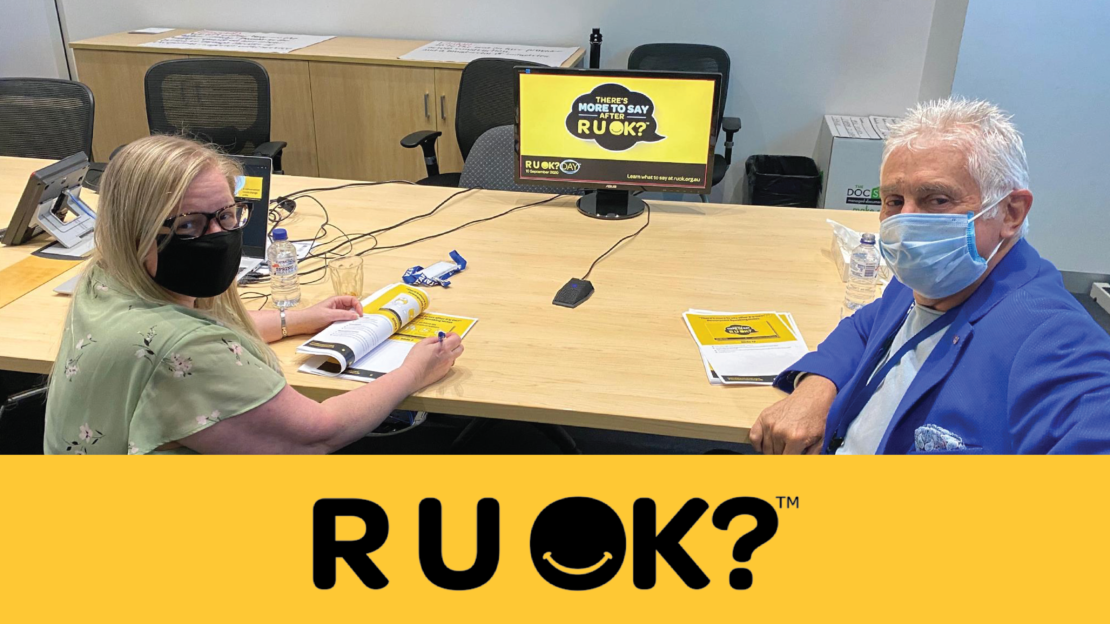R U OK? Day: There’s more to say after R U OK?
On Thursday the 10th of September, Australia asked one another “R U OK?” to open conversation about mental health and suicide prevention. R U OK? is a suicide prevention charity that aims to remind people that having meaningful conversations with loved ones, friends, and colleagues could save a life. R U OK? inspire and empower the community to meaningfully connect with the people around them and encourage conversation with anyone who may be struggling with life’s ups and downs.
R U OK? Day has never been more important to recognize as it is this year. 2020 has been a particularly challenging year for us all, disrupting our ability to stay connected to each other during a time when we need one another the most. These circumstances have made it even more important for us all to stay connected and, for those who are able, to support those around us.
MC Labour challenged our community to share a selfie to show their support of R U OK? Day and to help MC Labour make a “big noise” about the importance of being open to conversation about mental health and suicide prevention. It was wonderful to see the quick and positive response from our community to this call.
In addition to this, we held an online R U OK? event to remind our MC Labour family that every day is the day to ask “Are you OK?”, and that “There’s more to say after R U OK?”. Our hosts, MC Labour’s HR Manager Fleur Tapper and Relationship Manager John Morris, talked about the impact of an R U OK? conversation, provided tips for what to say when someone says they are not OK, outlined how you can continue a conversation that could change a life, and shared their personal experiences.
In MC Labour’s online event, Fleur and John asked “Why are you asking someone if they’re ok?” We ask the people in our lives if they are ok when we notice something in their behavior or actions that is out of character and worrying. They encouraged that “When you notice a change, no matter how small, trust your gut instinct and ask R U OK?”
“A conversation could change a life”
Before you can support someone else “R U OK?”, though, you need to make sure you’re looking after yourself. Not being ready to ask someone if they are ok is ok. You need to remember that you may not be the best person to have that conversation, but that does not leave you powerless. If you feel unable to have the conversation or as though you are not the appropriate person to initiate the conversation, you can mention to a more appropriate person about your worries and ask them to have that conversation. It is good to remember there are multiple ways to help.
How do you get prepared to have the conversation:
- Am I ready: Are you in the right headspace? Are you willing to listen to someone when they say they aren’t ok? Make the time!
- Am I prepared: Know that you might get the answer that says “no I’m not ok” so how are you going to deal with that? Have something up your sleeve to say in response. Remember you’re not responsible for solving someone’s problem, be there to listen. Sometimes they’re not prepared to talk in that moment, so let them know you’re there when they are ready to speak.
- Have I picked my moment: Where is it appropriate to have the conversation? Pick a private comfortable, convenient moment, and make sure you have plenty of time to have the conversation.
Fleur and John also expressed that when we ask the question, we have to be prepared to listen, and listening can be the hardest part. We don’t ask someone “are you ok” without reason, so make sure you’re prepared to listen and engage when asking the question, otherwise there isn’t a point in asking. Sometimes they will respond with “I’m fine”, but pay attention to attitude and body language, not everyone who says they are fine is ok.
Fleur and John also went into detail about the four steps of the conversation, and how to go about approaching each of them.
The four steps to having a conversation that could change a life:
- Ask R U OK?
- Listen
- Encourage action
- Check-in
An important point covered by the pair in the R U OK? Event was that “you do not need to be an expert to reach out – just a good friend and a great listener”.
Make sure to watch the full event for more information about how to approach the conversation, and what to do when someone in your life isn’t ok.
For more information about R U OK? head to https://www.ruok.org.au/
Other supports:
Lifeline
Phone: 13 11 14
Website: https://www.lifeline.org.au
Beyond Blue
Phone: 1300 22 4636
Website: https://www.beyondblue.org.au/
Suicide Call Back Service
Phone: 1300 659 467
Website: https://www.suicidecallbackservice.org.au/
MensLine Australia
Phone: 1300 78 99 78
Website: https://mensline.org.au/
Kids Helpline
Phone: 1800 33 1800
Website: https://kidshelpline.com.au/
Incolink
Incolink offers free and confidential counseling to all workers and their families 24 hours a day, 7 days a week. (Victorian workers)
Phone: 1300 000 129
Website: https://www.incolink.org.au/wellbeing-support-services/247-counselling/
Mates in Construction
MATES offer a support line and case management to workers who need help and support. (South Australian & Tasmanian workers)
Phone: 1300 642 111
Website: https://mobileapp.matesinconstruction.org.au/construction/support
